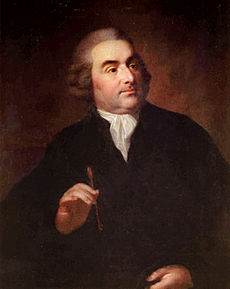Pieter Camper
| Petrus Camper | |
|---|---|

Petrus Camper
|
|
| Born | 11 May 1722 Leiden |
| Died |
7 April 1789 (aged 66) The Hague |
| Nationality | Dutch |
| Alma mater | University of Leiden, Oxford College |
| Known for | inventing the term "extinct" along with Georges Cuvier to describe the mammoth |
| Scientific career | |
| Fields |
anatomist physiologist philosopher surgeon (dissection) Draughtsman |
| Institutions | University of Franeker, Amsterdamse Atheneum, University of Groningen |
| Doctoral students | Martin van Marum |
Peter, Pieter, or usually Petrus Camper (11 May 1722 – 7 April 1789), was a Dutch physician, anatomist, physiologist, midwife, zoologist, anthropologist, palaeontologist and a naturalist. He studied the orangutan, the rhinoceros, and the skull of a mosasaur, which he believed was a whale. One of the first to interest himself in comparative anatomy and palaeontology, he invented the measure of the facial angle. Camper was a celebrity in Europe and a member of the Royal Society. He was interested in architecture, mathematics, and illustrated his own lectures. He designed and constructed tools for his patients, and for surgeries. He was a sculptor, a patron of art and a conservative politician.
Camper was the son of a well-to-do minister, who made his fortune in the East Indies. A brilliant alumnus, he studied medicine and philosophy at the University of Leiden, and obtained a degree in both sciences on the same day at the age of 24. His professors included Pieter van Musschenbroek and Willem Jacob 's Gravesande for physics and mathematics, Herman Boerhaave and Hieronymus David Gaubius for medicine, and François Hemsterhuis for philosophy. After both his parents died Camper then travelled in 1748 to Prussia, England (where he met with William Smellie), France and Switzerland. He was named professor of philosophy, anatomy and surgery in 1750 at the University of Franeker.
...
Wikipedia
